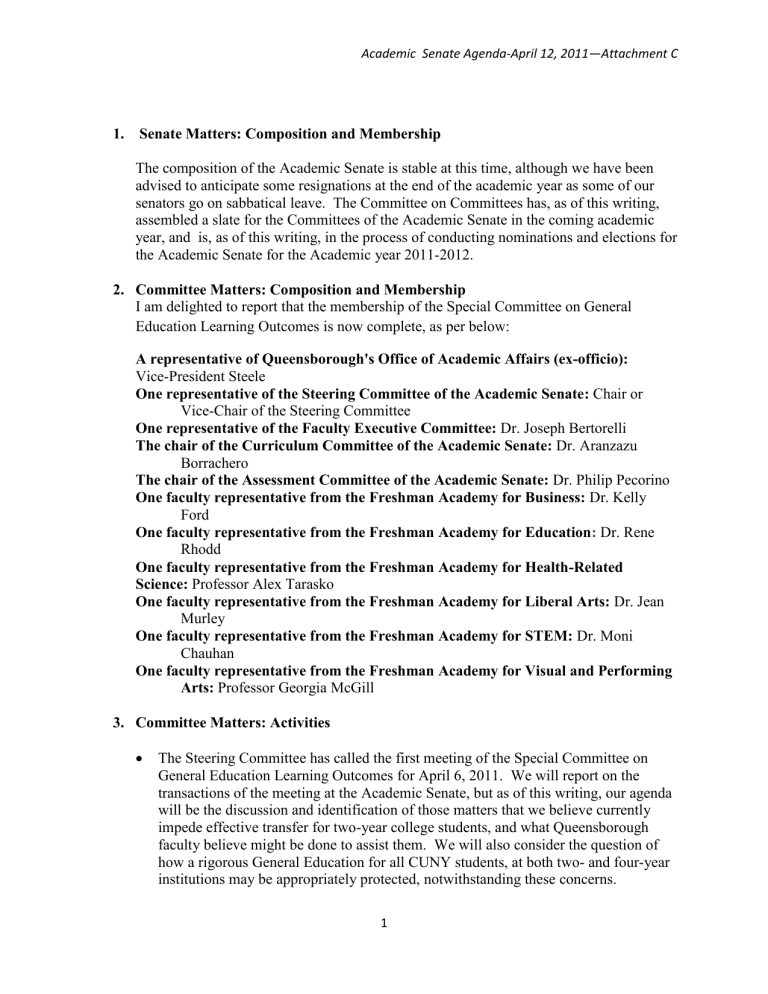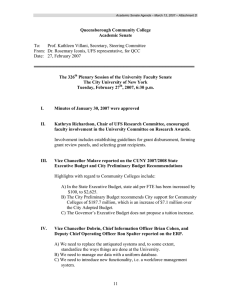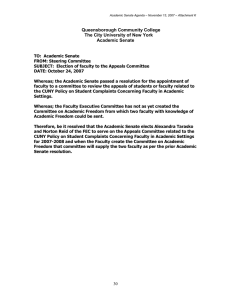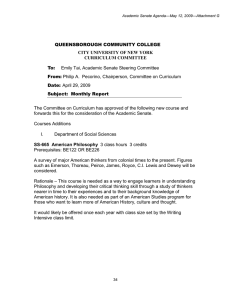1. Senate Matters: Composition and Membership

Academic Senate Agenda-April 12, 2011—Attachment C
1.
Senate Matters: Composition and Membership
The composition of the Academic Senate is stable at this time, although we have been advised to anticipate some resignations at the end of the academic year as some of our senators go on sabbatical leave. The Committee on Committees has, as of this writing, assembled a slate for the Committees of the Academic Senate in the coming academic year, and is, as of this writing, in the process of conducting nominations and elections for the Academic Senate for the Academic year 2011-2012.
2.
Committee Matters: Composition and Membership
I am delighted to report that the membership of the Special Committee on General
Education Learning Outcomes is now complete, as per below:
A representative of Queensborough's Office of Academic Affairs (ex-officio):
Vice-President Steele
One representative of the Steering Committee of the Academic Senate: Chair or
Vice-Chair of the Steering Committee
One representative of the Faculty Executive Committee: Dr. Joseph Bertorelli
The chair of the Curriculum Committee of the Academic Senate: Dr. Aranzazu
Borrachero
The chair of the Assessment Committee of the Academic Senate: Dr. Philip Pecorino
One faculty representative from the Freshman Academy for Business: Dr. Kelly
Ford
One faculty representative from the Freshman Academy for Education : Dr. Rene
Rhodd
One faculty representative from the Freshman Academy for Health-Related
Science: Professor Alex Tarasko
One faculty representative from the Freshman Academy for Liberal Arts: Dr. Jean
Murley
One faculty representative from the Freshman Academy for STEM: Dr. Moni
Chauhan
One faculty representative from the Freshman Academy for Visual and Performing
Arts: Professor Georgia McGill
3.
Committee Matters: Activities
The Steering Committee has called the first meeting of the Special Committee on
General Education Learning Outcomes for April 6, 2011. We will report on the transactions of the meeting at the Academic Senate, but as of this writing, our agenda will be the discussion and identification of those matters that we believe currently impede effective transfer for two-year college students, and what Queensborough faculty believe might be done to assist them. We will also consider the question of how a rigorous General Education for all CUNY students, at both two- and four-year institutions may be appropriately protected, notwithstanding these concerns.
1
Academic Senate Agenda-April 12, 2011—Attachment C
We have been in communication with the Committee on Assessment and Institutional
Effectiveness, which is in the process of developing a template for institutional assessment, to be unveiled in May. This template will link the process of institutional assessment to the existing Committee structure, giving committees of the Academic
Senate an opportunity to request and review reports by administrative units of the
College to insure that the process of administration is a reflective one, in which shared governance is fully involved. Members of the Academic Senate may be interested to hear that the Steering Committee will not be isolated from this process— we, too, have been asked by the Committee on Assessment to consider how the process of governance might be assessed for continuous improvement on our campus!! The Steering Committee welcomes the suggestions of our Senators, while we deliberate concerning this matter!
As of this writing, the Committee on Committees has developed a slate of Committee members for each committee next year. Faculty members who may have desired a committee assignment but who forgot to file paperwork should be confident that there will inevitably be some vacancies as we move into the next academic year; and so we invite any such faculty to make themselves known on the form that was sent with the
Committee on Committee’s invitation to vote on the current committee slate.
The Committee on Computer Resources is in receipt of Queensborough’s Technology
Plan for 2011-2015, and will be meeting with the Presidential Committee that drafted this plan over the coming weeks.
The Special Budget Advisory Committee has also met with Vice-President
Newcomb, and will be presenting a report on its transactions at the May Senate.
The Committee on Environment, Quality of Life, and Disability matters is in the process of reviewing several issues of importance. The most pressing of these, as many on this campus will agree, is the implementation of the new CUNY Smoking
Policy, which will go into formal effect in 2012. As of this writing, the Committee is reviewing a lengthy implementation template, that covers everything from campus signage and the distribution of nicotine patches, to suggestions regarding reminder emails. The Committee on Environment, Quality of Life, and Disability Matters will also be reviewing the Public Employer Workplace Violence Prevention Site
Assessment Walk-Through Report which was recently conducted by representative of the New York State Department of Labor, and the guidelines established by the
CUNY Office of the Vice-Chancellor of Student Affairs for Behavioral Intervention
Teams.
4.
University and College Wide Matters with Direct Bearing on the Senate
Draft Resolution on General Education and Transfer at CUNY
The text below represents the University Faculty Senate’s response to the proposal advanced by the office of Executive Vice-Chancellor Logue concerning the creation of a
2
Academic Senate Agenda-April 12, 2011—Attachment C
36-credit general education curriculum that would be portable from community colleges to senior colleges, as per materials available on http://www.cuny.edu/about/administration/offices/ue/degreepathways.html
.
Members of the Academic Senate may have been in attendance at the Faculty Meeting of
Friday, March 25, 2011, when Executive Vice-Chancellor Logue was kind enough to visit our campus to make a case for these proposals.
As of this writing, a variety of perspectives on these proposals have been voiced by various members of faculty across the CUNY campuses, ranging from strong condemnation of a proposal that is viewed as potential destructive to academic rigor (the view taken by the faculty of Baruch College, Hunter College, Brooklyn College, City
College, and the College of Staten Island, all of whom have offered governance body resolutions urging that the Pathways initiative be substantially slowed pending further consideration); to support for the Chancellor’s proposal from faculty representatives at
Borough of Manhattan Community College, Bronx Community College, and
Kingsborough Community College, who argue that students are often unnecessarily required to repeat courses on senior college campuses that they have already taken on community college campuses.
The USF statement is one of several resolutions that has consequently been issued by governance and curricular bodies throughout CUNY, urging a slower pace in the reorganization of General Education to address transfer issues, and a greater attention to other issues that may be offering impediment to our students, such as insufficient advising. Many of these resolutions have, moreover, questioned the conflation of General
Education and Transfer, as does the USF resolution.
It will be up to our Academic Senate, and our own Special Committee on General
Education Learning Outcomes, to decide whether Queensborough’s Academic Senate wishes to endorse this statement. The Steering Committee continues to invite comment concerning what is perceived to be in the best interests of our institution and our students.
At the University Faculty Senate Plenary of March 15, the University Faculty Senate passed (72 present, 5 negatives, 3 abstentions) the following statement of principles in regard to the Draft Resolution on General Education and Transfer at CUNY:
University Faculty Senate Statement on CUNY’s Proposed General Education
Framework
I. The faculty of CUNY understands and appreciates the many obstacles faced by our students in obtaining their undergraduate degrees, and admires their perseverance.
The faculty strongly supports exploring improved means of expediting degree completion as long as those means are compatible with existing academic standards.
II. The three overriding principles that must control all policy-making in this area are (1) college faculty authority over each college’s curriculum (2) the authority of each campus to preserve its own distinct academic mission and personality within the CUNY system and (3) students’ rights to clear, consistent and timely recognition of transfer credit across CUNY.
3
Academic Senate Agenda-April 12, 2011—Attachment C
III. We strongly recommend that the administration recognize the separate nature of the issues of transfer, which is an operational matter, and general education, which is an academic and curricular matter. Future reports and future committees should respect this distinction.
IV. We believe that transfer problems may be addressed more effectively by various measures including , but not limited to, enhancing academic advising, upgrading technology to allow faculty to see transfer students’ whole transcripts, making the TIPPS system workable, creating a TIPPS for the entire curricula, and continuing articulation as well as dual-joint degree efforts. We also suggest that the role, function, and transferability of the University’s associate degrees (AA, AS, and AAS) be clarified and made more precise to students.
V. Finally, colleges must have the flexibility to determine their own general education
structure.
4



